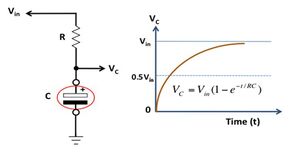Capacitors
Capacitors hold a 'capacity' of electronics. You may want to take up Meditation if this is confusing.
List
- https://www.eevblog.com/forum/projects/how-is-a-motor-run-capacitor-sized/ - Motor run capacitors (e.g. HVAC fan motor capacitors)
- https://theamphour.libsyn.com/596-capacitor-schoopage-with-ron-demcko-from-avx - A very good episode on Capacitors. For example, there are more to Electrolytics than Aluminum ones.
Capacitor Testing List
There was a hackaday article on testing capacitors. It included steps such as looking at ESR, testing for a short, and a few other steps. I can't find it right now, but I'll leave this here, as the search engines may find it later. I think Charvat wrote it.
Ceramics
there are two kinds of ceramic capacitors. both have the potential to change their capacitance value significantly with temperature but it depends upon which code/material they are. Of course, you should also remember that a ceramic will not have the same capacitance at different voltages (not covered in the article, i think i've heard this in the amp hour), so for critical applications, you have to pay attention to the specified voltage of a cap wrt its applied voltage. The article mentions that DC Bias may have an effect on certain ceramics. I would have to look into this. I also don't know if I believe that ceramics age. It's a rock (though everything can age if exposed to heat and light). There is a note about ceramics and how package size impacts performance (this I have heard and it is something to remember. it applies to all SMD packages (resistors as well)). I suppose there is a worthwhile test to be had in aging a ceramic capacitor and seeing if anything changes. It may depend on temperature or humidity changes in an environment, similar to how metals rust (they will rust more in an less-heated space vs. a comfortable home environment). It mentions there are simulation tools for the capacitors (which ones?) from vendors.
Tantalums
Shielded Capacitors
Some testing of shield capacitors is in order. (Originally saw in N&V 2020-5)
Tips/Techniques
AC Impedance
I put an article about this in my book of hacks. At AC frequencies, certain caps (usually around 1uf or lower) start to get higher impedance. This can be a problem if you want to, e.g. pass audio across a DC blocking cap, but you choose a small ceramic as opposed to a 10uf electrolytic. See the book for more details.
Calculating Impedance / Reactance
Electrical Impedance (Z), is the total opposition that a circuit presents to alternating current. Impedance changes according to the components in the circuit and the frequency of the applied AC. Impedance can include resistance (R), inductive reactance (XL ), and capacitive reactance (XC). It is not simply the algebraic sum of the resistance, inductive reactance, and capacitive reactance. Inductive reactance and capacitive reactance are 90o out of phase with the resistance, so that their maximum values occur at different times. Therefore, vector addition must be used to calculate impedance. (from IET Labs LCR Measurement Primer)
Given you have an LCR meter and you put it to Z mode with a single capacitor, let's just consider it the impedance for now (though it is primarily reactive capacitance). If you do not have an impedance mode on your LCR meter, than you can calculate it from the capacitance reading as well as the frequency the LCR meter is using. Per EEVblog 137, with the BK Precision 879b, the formula is below.
- https://www.ietlabs.com/pdf/application_notes/030122%20IET%20LCR%20PRIMER%201st%20Edition.pdf - IET Labs LCR Measurement Primer 1st Edition, Feburary 2018
- https://bkpmedia.s3.amazonaws.com/downloads/guides/en-us/lcr_meter_guide.pdf - BK Precision LCR Meter Guide
Resonant Frequencies of (input/output filter) Caps
Capacitance will differ based on the frequency. One reason why LCR meters have two different frequencies to test at. You can take it a step further though, and setup something like an analog discovery to do a full frequency vs. reactance characterization. See: https://tahmidmc.blogspot.com/2024/03/electrolytic-caps-over-frequency-why-is.html per Hackaday: https://hackaday.com/2024/04/01/why-is-my-470uf-electrolytic-cap-more-like-20uf/ http://web.archive.org/web/20240402042237/https://tahmidmc.blogspot.com/2024/03/electrolytic-caps-over-frequency-why-is.html This has been discussed on the amp hour, referring to this article http://web.archive.org/web/20231208203302/https://www.signalintegrityjournal.com/articles/1589-the-myth-of-three-capacitor-values and if my memory isn't completely trashed, it came out to be: "most of the time you just throw a couple different values of caps on there and don't investigate unless necessary (but you should be aware of this trap)" or something like that. And that the signal integrity blog was 'technically correct' but for all practical purposes not correct (i.e. you won't have time to do a thorough analysis, although everything they wrote is true). I can't find the amp hour episode at the moment. Around 400. The impedance analyzer part (what you want) of the analog discovery is covered in detail here: https://digilent.com/reference/test-and-measurement/guides/waveforms-impedance-analyzer http://web.archive.org/web/20240303181454/https://wiki.digilent.com/reference/test-and-measurement/guides/waveforms-impedance-analyzer
This is an ongoing debate in electronics, much like tabs vs. spaces...
Ripple on Input/Output Capacitors
A given switcher may have an input and output capacitor. There are acceptable values for input/output ripple (see Switchers#Calculators). This may be a hint of the capacitor failing.
Input Filter Capacitor Resources
For switchers
"As it is a bulk input cap, it has to be able to pass at least the average current of the load."
With any LC circuit (either intentional or through parasitics) you can get oscillations. LC TANK.
LC Tank from 24V AC Adapter and Laptop DC-DC Supply. Avoiding overshoot. Comparison of different overshoot based on capacitors (perhaps it is possible to detect ESR failure with a close look at overshoot. I should test this.
Student Manual for Art of Electronics (ver 2.)
From the text:
MOhm and uF give time-constants in seconds kOhm and uF give time-constants in milliseconds
1 RC is 63% (I need to remember this one)( I R C 6 3 : technically it rhymes. )
5 RC is 99% (or basically full) (note that 1RC and 5RC are for constant voltage, not constant current...)
t = RC
1millisecond = 1k and 1uF
1second = 1M and 1uF
0.1 second = 100k and 1uF
0.01 second = 10k and 1uF



